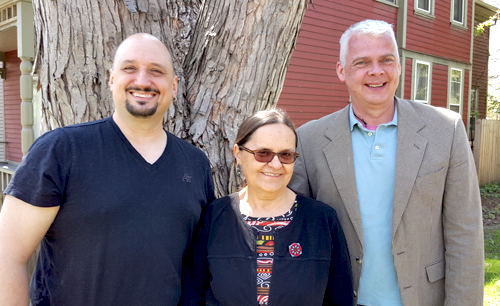 The idea of becoming a Native American
The idea of becoming a Native American
trade ambassador came to Diane Gorney during one of her recent
excursions to France. “Walking down the streets in Paris people
kept coming up and offering to buy the jewelry right off of me,”
says the Minneapolis resident and White Earth descendant.
Gorney refused to sell the stunning
beaded earrings, necklaces and bracelets she had purchased from
Ojibwe artists back home. From those interactions, however, she came
to understand the appetite French people have for all things Native
American. In their hunger Gorney saw an opportunity to help her
Ojibwe people. She investigated the availability of American Indian
items such as traditional art and jewelry, and hand-harvested
Minnesota wild rice.
The “Native American art” Gorney
found in Parisian shops was of poor quality and manufactured in
China. Gorney’s search for wild rice led her across the French
capital. French cookbooks and menus frequently reference an
ingredient called “riz sauvage (translation: wild rice),” so
Gorney was mystified when she couldn’t find it in stores. Finally,
at an obscure kosher market, Gorney ran across riz sauvage, but found
the product nothing like the natural cereal grain which flourishes
upon Minnesota’s northern waters.
The graphic on the packaging of
France’s leading brand of riz sauvage, Tilda Giant Wild Rice, lends
the impression the black rice is harvested by Native Americans. Its
box cover contains an image of two American Indians poling a birch
bark canoe through a wild rice bed. But a closer look reveals the
truth: the product marketed in France as Native American wild rice is
actually Indonesian, paddy-cultivated, black basmati rice, packaged
and distributed by a Britain-based food brand selling in over 50
countries.
Gorney, a former art teacher, soon
returned to Paris with a suitcase full of White Earth wild rice. She
handed out one-pound bags to chefs and others whom she hoped would
spread the word about the nutritious, delicious and sacred grain. “I
wanted them to share, but people loved it so much they kept it for
themselves. So my efforts were dead on arrival.”
Back in Minnesota, Gorney converted
her frustration into action, assembling a team to open the French
market to Native American goods from Minnesota. As this issue of The
Circle went to press in late April, Gorney and her delegation were
departing for Paris where they were scheduled to meet with trade
officials at the U.S. Embassy and promote Native goods from Minnesota
at one of France’s largest provincial fairs, the Foire de Tours.
“I just want to get Minnesota Native
arts and wild rice sold in France,” Gorney said. “It seems very
logical for these to be available there. If we are successful, it
will mean access to real arts and wild rice for the French, and more
money for our people on the rez.”
Greg Bellanger, a member of the White
Earth Nation and owner of Northland Visions: Native American Fine Art
and Gifts from the Northland (1113 East Franklin Ave., Minneapolis),
is a participant in the trade delegation. He says his efforts are
motivated by a desire to “create a greater demand for Minnesota
Native goods, so that we can increase the number of tribal members
able to make a living as artists and traditional wild rice
harvesters.”
When his father, Ken Bellanger, opened
the store in 2000, he sold 500 pounds of Wild Rice in the first 12
months, which he purchased directly from White Earth and Leech Lake
band citizens. Today, Northland Visions sells over 3,000 pounds of
Native-harvested Minnesota wild rice annually. Despite the increasing
demand, Greg Bellanger says there is plenty more wild rice available.
“A ton of rice is left behind at the end of each season. My people
at White Earth and Leech Lake are capable of harvesting as much rice
as we will need.”
Bellanger doesn’t anticipate selling
anything on the initial trip. He’s only carrying wild rice samples
and photographs that represent available artworks. “This trip is
all about relationship building,” he said. “We’re going there
to meet and greet, shake hands, have dinner and get to know each
other. That’s the way the French do business.”
Bellanger expects the wild rice to
practically sell itself. “We’re going to stress the fact that
each rice harvest is limited edition. It can only be harvested once a
year. It can only be cultivated in this part of the world. And we
only sell hand harvested rice from tribal members. Which, when people
understand this, adds to the value of the product. It is also
completely wild organic,” he said.
“Our biggest challenge will be
marketing, making the French public aware that what we’re offering
is not the same as riz sauvage,” Mike O’Dell, the delegation’s
export management director, said. To avoid confusion, O’Dell said
the trade group plans to present Minnesota wild rice by its Ojibwe
name, manomin (“good berry”).
O’Dell, who has a master’s degree
in international marketing, spent eight years living in France and
speaks fluent French, says the question the delegation will be asking
is “Why haven’t efforts to sell manomin in France and other
European markets succeeded in the past.” O’Dell believes one
reason is the two-year tribal government election cycle. “Any
efforts that have been initiated have been abandoned with changes in
leadership. There has been no consistency driving an export program.”
O’Dell believes, however, that this delegation has the right
mixture of passion and expertise to make wild rice a staple of the
French table.
“My French friends are very excited.
The French love all things Native American. They also love high
quality food. Minnesota Native, hand-harvested, and fire roasted
manomin has the potential to become very popular is France. We hope
it will find a lasting place among the many other luxury food items
the French love to use in their cuisine,” O’Dell said.
PHOTO: Greg Bellanger, Diane Gorney,
Mike O’Dell constitute a delegation of Ojibwe entrepreneurs who are
meeting with trade officials at the French U.S. Embassy to promote
Native goods from Minnesota at one of France’s largest provincial
fairs, the Foire de Tours. (Courtesy photo).







